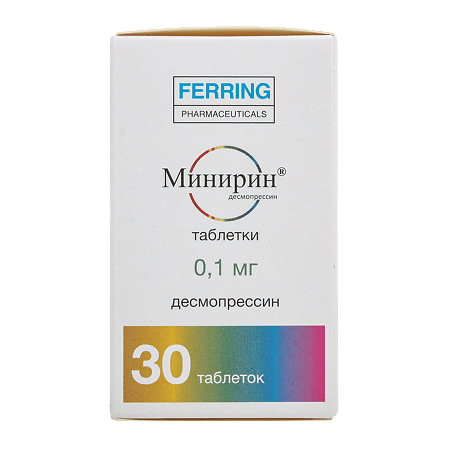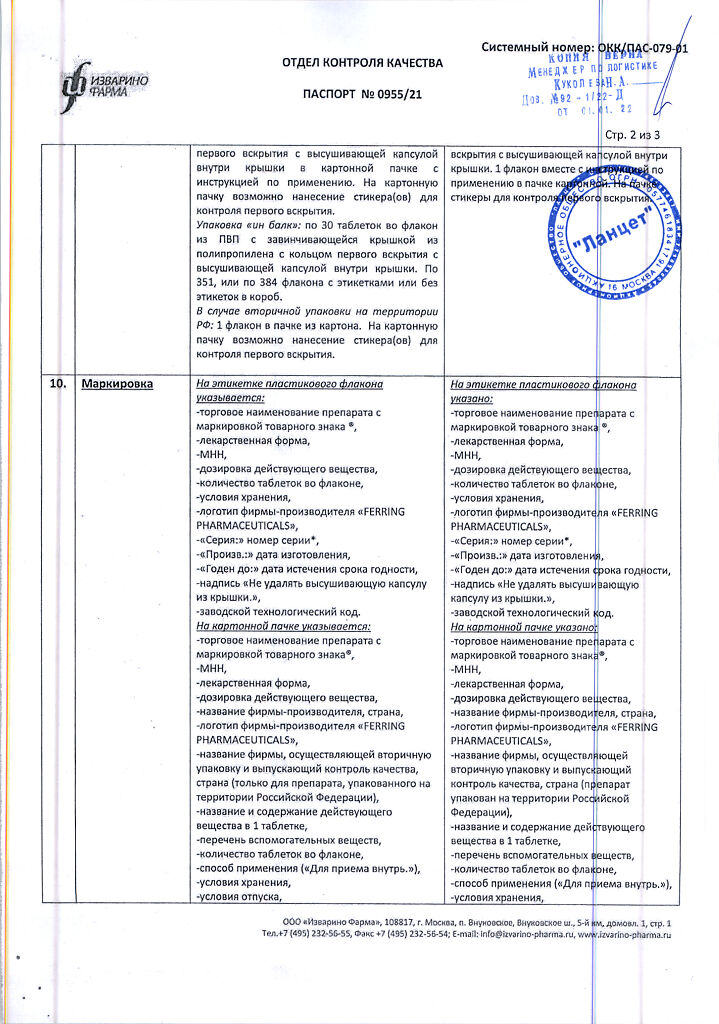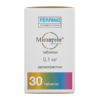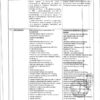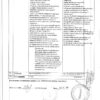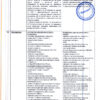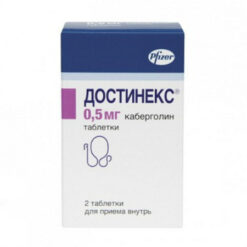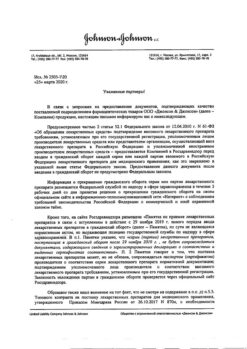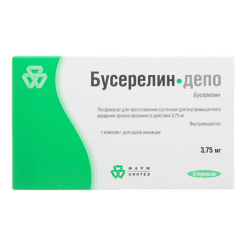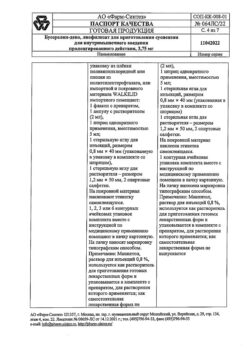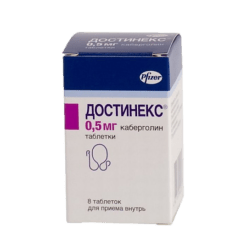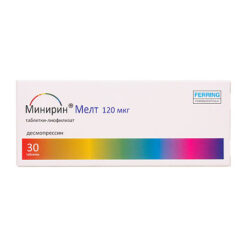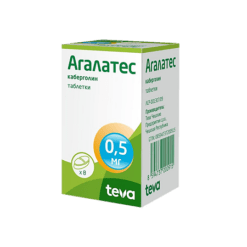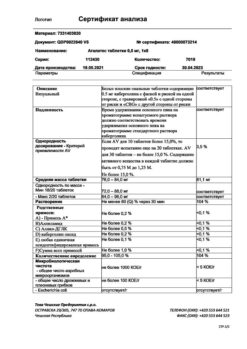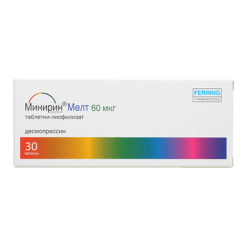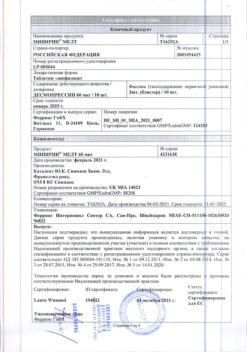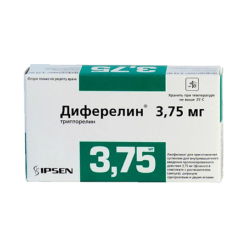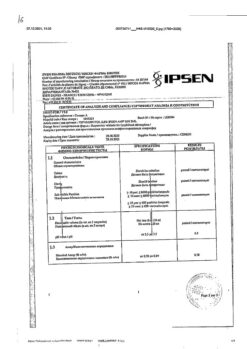No products in the cart.
Minirin, tablets 0.1 mg 30 pcs
€1.00
Out of stock
(E-mail when Stock is available)
Description
Minirin is a vasopressin-like agent.
Pharmacodynamics
Desmopressin is a structural analogue of arginine vasopressin, human pituitary hormone. The difference is the deamination of cysteine and the replacement of L-arginine by D-arginine. This leads to a much longer duration of action and no vasoconstrictor effect at all.
Desmopressin increases permeability of the epithelium of the distal tubules and increases water reabsorption, resulting in a decrease of urine output, increased urine osmolarity with a simultaneous decrease of blood plasma osmolarity, decreased frequency of urination and decreased nocturia (nocturnal polyuria).
Pharmacokinetics
The bioavailability of desmopressin in sublingual form in doses of 200, 400 and 800 mcg is about 0.25%.
The Cmax of desmopressin in plasma is reached within 0.5-2 hours after taking the drug and is directly proportional to the amount of dose taken: after taking 200, 400 and 800 mcg the Cmax was 14, 30 and 65 pg/mL respectively.
Desmopressin does not penetrate the HEB. Desmopressin is excreted by the kidneys, T1/2 is 2.8 h.
Indications
Indications
diabetes insipidus of central origin;
primary nocturnal enuresis in children over 6 years of age;
nocturia (nocturnal polyuria) as symptomatic therapy.
Pharmacological effect
Pharmacological effect
Minirin is a vasopressin-like.
Pharmacodynamics
Desmopressin is a structural analogue of arginine vasopressin, a human pituitary hormone. The difference is the deamination of cysteine and the replacement of L-arginine with D-arginine. This leads to a significant extension of the period of action and a complete absence of vasoconstrictor effect.
Desmopressin increases the permeability of the epithelium of the distal convoluted tubules and increases water reabsorption, which leads to a decrease in the volume of urine excreted, an increase in urine osmolarity with a simultaneous decrease in blood plasma osmolarity, a decrease in urinary frequency and a decrease in nocturia (nocturnal polyuria).
Pharmacokinetics
The bioavailability of desmopressin in sublingual form at doses of 200, 400 and 800 mcg is approximately 0.25%.
Cmax of desmopressin in blood plasma is achieved within 0.5–2 hours after taking the drug and is directly proportional to the dose taken: after taking 200, 400 and 800 mcg, Cmax was 14, 30 and 65 pg/ml, respectively.
Desmopressin does not penetrate the BBB. Desmopressin is excreted by the kidneys, T1/2 is 2.8 hours.
Special instructions
Special instructions
It is mandatory to limit fluid intake to a minimum 1 hour before taking the drug and for 8 hours after taking the drug in patients with primary nocturnal enuresis. Failure to follow this rule may result in side effects.
Patients over 65 years of age with an initially low sodium concentration in the blood plasma and polyuria of 2.8–3 l/day have a high risk of developing side effects.
In cases of acute urinary incontinence, dysuria and/or nocturia, urinary tract infection, if a tumor of the bladder or prostate gland is suspected, in the presence of polydipsia and decompensated diabetes mellitus, it is necessary to diagnose and treat these conditions and diseases before starting treatment with Minirin®.
In case of acute concomitant diseases, such as systemic infections, fever, gastroenteritis, accompanied by an imbalance of fluid and electrolytes, the drug should be discontinued.
The drug is prescribed with extreme caution to elderly patients (65 years and older) due to the high risk of side effects (fluid retention and hyponatremia).
When prescribing the drug Minirin® in these cases, it is necessary to determine the concentration of sodium in the blood plasma before starting the drug, 3 days after starting the drug, and with each dose increase. It is necessary to monitor the patient’s condition during the entire period of taking Minirin®.
Influence on the ability to drive a car and operate machinery. Minirin® does not have a direct effect on the ability to drive a car or operate machinery. However, fluid retention due to poor drinking habits or an overdose of Minirin® can cause dizziness.
Active ingredient
Active ingredient
Desmopressin
Composition
Composition
Active ingredient:
desmopressin acetate 100 mcg;
Excipients:
lactose,
potato starch,
povidone,
magnesium stearate
Pregnancy
Pregnancy
There were no side effects on the course of pregnancy, the health of the pregnant woman, the fetus and the newborn when taking the drug Minirin®. However, caution should be exercised when prescribing Minirin® to pregnant women.
The dose at which desmopressin can enter the newborn’s body through the breast milk of a woman taking high doses (about 300 mcg) of desmopressin is not able to affect the child’s diuresis.
The decision to continue breastfeeding is made if the benefit to the mother outweighs the potential risk to the baby.
Contraindications
Contraindications
hypersensitivity to desmopressin or other components of the drug;
habitual or psychogenic polydipsia (with a urine output volume of 40 ml/kg/day);
heart failure and other conditions requiring the use of diuretics;
hyponatremia;
moderate to severe renal failure (creatinine Cl below 50 ml/min);
syndrome of inadequate production of antidiuretic hormone;
children under 6 years of age.
If the patient has one of the listed diseases, he should definitely consult a doctor before taking the drug.
With caution: renal failure (Cl creatinine >50 ml/min); fibrosis of the bladder; water-electrolyte imbalance; potential risk of increased intracranial pressure; pregnancy; old age (65 years and older).
Side Effects
Side Effects
The most common side effects are observed in cases where treatment is carried out without limiting fluid intake and fluid retention and/or hyponatremia occurs, which may be asymptomatic or manifested by the following symptoms: headache, dizziness, nausea, vomiting, dry mouth, peripheral edema, weight gain; in severe cases – convulsions.
If any of the side effects indicated in the instructions worsen or any other side effects not listed in the instructions appear, you must inform your doctor.
Interaction
Interaction
Tricyclic antidepressants, SSRIs, chlorpromazine and carbamazepine, which can cause syndrome of inappropriate antidiuretic hormone secretion, may enhance the antidiuretic effect of Minirin® and increase the risk of fluid retention and hyponatremia.
Concomitant use of NSAIDs also increases the risk of side effects.
Combination with loperamide can lead to a threefold increase in plasma concentrations of desmopressin and increase the risk of side effects (fluid retention, hyponatremia). It is possible that other drugs that reduce intestinal smooth muscle tone and motility may have a similar effect.
When prescribing Minirin® with the above drugs to prevent the development of hyponatremia, it is necessary to regularly determine the concentration of sodium in the blood plasma.
Overdose
Overdose
Symptoms: overdose leads to an increase in the duration of action of the drug and an increased risk of fluid retention and hyponatremia. In case of overdose, consult a doctor.
Treatment: therapy for hyponatremia should be individualized; discontinuation of the drug and lifting of fluid intake restrictions are mandatory. If there are symptoms of overdose, an infusion of isotonic or hypertonic sodium chloride solution is possible. In case of severe fluid retention (convulsions and loss of consciousness), furosemide should be additionally prescribed.
Storage conditions
Storage conditions
In a dry place, at a temperature not exceeding 25 °C and relative air humidity up to 60%
Shelf life
Shelf life
2 years
Manufacturer
Manufacturer
FERRING INTERNATIONAL CENTER S.A., Switzerland
Additional information
| Shelf life | 2 years |
|---|---|
| Conditions of storage | In a dry place, at a temperature not exceeding 25 °C and a relative humidity of up to 60% |
| Manufacturer | Ferring GmbH, Switzerland |
| Medication form | pills |
| Brand | Ferring GmbH |
Related products
Buy Minirin, tablets 0.1 mg 30 pcs with delivery to USA, UK, Europe and over 120 other countries.

